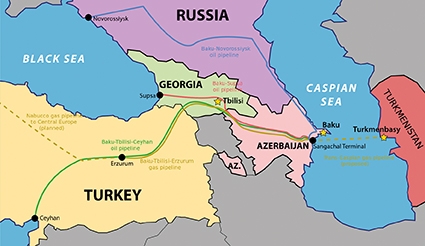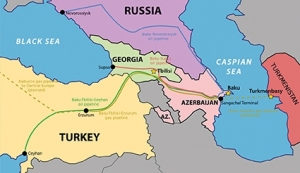Turkmenistan Must Cooperate with Azerbaijan, Turkey to Enter EU Market
Turkmenistan needs to cooperate with Azerbaijan and Turkey to enter the gas market in Europe, expert on Central Asia, Bruce Pannier, stated last week.
On June 22, the Russian legal information portal published the full text of the draft convention on the legal status of the Caspian Sea. According to Article 14 of the Convention, two states can lay submarine pipelines with the approval of countries owning the maritime sectors that the pipelines pass through.
“It seems that the implementation of the Trans-Caspian gas pipeline (TCP) has become possible,” Pannier said.
The expert noted that TANAP is connected by plans for laying the TCP, so Turkmenistan would have to cooperate with Azerbaijan and Turkey to ensure the supply of its gas to Europe.
Turkmenistan has about 17 trillion cubic meters of gas, which is why, according to Pannier, the country can supply it also to China via the TCP and other pipelines.
It was reported that the Central Asia-China gas pipeline, which supplies gas from Turkmenistan to China, is operating at almost full capacity in the current state, and Beijing will probably have to look for additional sources of gas. By connecting Turkmenistan to China’s domestic grid, this pipeline makes it possible to transport gas some 7000 km from Turkmenistan to Shanghai.
“Branches A, B and C of the network of Central Asian pipelines are approaching full capacity, and there are plans for the construction of a D branch, which is lagging behind schedule by at least four or five years. Branch D will increase the capacity by another 25-30 billion cubic meters,” the expert noted.
Pannier recalled the Russian pipeline “The Power of Siberia,” which is expected to be completed by the end of 2019 and will eventually deliver to China another 38 billion cubic meters of gas. In addition, there is also a gas pipeline from Myanmar.
Pannier noted also that China is likely to pay more attention to the increasing importance of liquified natural gas (LNG).
“LNG import to China in 2018 grew by about 50% compared to 2017. Currently, China is building facilities for processing LNG from Qatar, Australia, Malaysia and also from the United States,” Pannier said.
Negotiations on the Trans-Caspian gas pipeline between the EU, Azerbaijan and Turkmenistan began in September 2011.
Official Ashgabat believes that laying the pipe along the bottom of the Caspian Sea, whose legal status has not yet been determined, will be enough for Turkmenistan and Azerbaijan. Azerbaijan expressed its readiness to offer its territory, transit opportunities and infrastructure for the implementation of this project.
Earlier, Vice President of the European Commission Maros Šefcovic said in an interview with Reuters that the EU, aiming to reduce its dependence on energy supplies from Russia, expects to receive gas from Turkmenistan in 2019.
By Dimitri Dolaberidze











